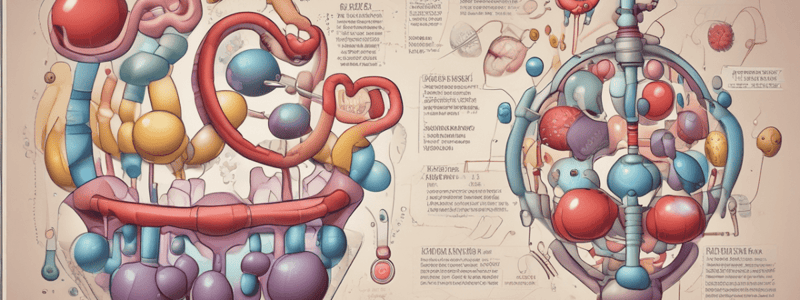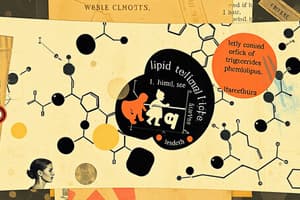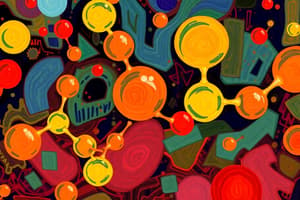Podcast
Questions and Answers
What is the main difference between fats and polysaccharides as energy sources?
What is the main difference between fats and polysaccharides as energy sources?
- Fats are more reduced and contain more electrons to generate ATP, while polysaccharides are less reduced.
- Fats are nonpolar and carry less water, while polysaccharides are polar and carry more water.
- Fats are used for short-term energy needs, while polysaccharides are used for long-term energy needs.
- Fats are used for long-term energy needs, while polysaccharides are used for short-term energy needs. (correct)
Vertebrates store fat in specialized cells called adipocytes, located mainly in the liver.
Vertebrates store fat in specialized cells called adipocytes, located mainly in the liver.
False (B)
What is the advantage of fats over polysaccharides in terms of energy production?
What is the advantage of fats over polysaccharides in terms of energy production?
Fatty acids carry more energy per carbon because they are more reduced, thus containing more electrons to pull off and generate ATP.
Fatty acid catabolism converts the chemical potential energy of fats into ________ in ATP.
Fatty acid catabolism converts the chemical potential energy of fats into ________ in ATP.
Match the following locations with their corresponding storage of fats.
Match the following locations with their corresponding storage of fats.
What happens to dietary triglycerides during digestion and absorption in the small intestine?
What happens to dietary triglycerides during digestion and absorption in the small intestine?
The fat biosynthesis and degradation pathways are the same.
The fat biosynthesis and degradation pathways are the same.
What is the significance of compartmentalization in fat biosynthesis and degradation pathways?
What is the significance of compartmentalization in fat biosynthesis and degradation pathways?
What is the result of glycerol being activated by glycerol kinase?
What is the result of glycerol being activated by glycerol kinase?
Fatty acid transport into the mitochondria requires carnitine.
Fatty acid transport into the mitochondria requires carnitine.
What is the product of fatty acid catabolism in the mitochondria?
What is the product of fatty acid catabolism in the mitochondria?
Glycerol is converted to ________ in glycolysis.
Glycerol is converted to ________ in glycolysis.
Match the following terms with their descriptions:
Match the following terms with their descriptions:
What is the primary source of energy for fatty acid catabolism?
What is the primary source of energy for fatty acid catabolism?
Fatty acid biosynthesis occurs in the cytoplasm.
Fatty acid biosynthesis occurs in the cytoplasm.
What is the enzyme that activates glycerol at the expense of ATP?
What is the enzyme that activates glycerol at the expense of ATP?
What is the advantage of glucose oxidation (glycolysis and TCA) for energy supply?
What is the advantage of glucose oxidation (glycolysis and TCA) for energy supply?
Malonyl-CoA, an early intermediate of fatty acid synthesis, activates carnitine acyltransferase I.
Malonyl-CoA, an early intermediate of fatty acid synthesis, activates carnitine acyltransferase I.
What is the purpose of malonyl-CoA in fatty acid metabolism?
What is the purpose of malonyl-CoA in fatty acid metabolism?
During β-oxidation of mono-unsaturated fatty acids, an isomerase is used to facilitate the process after ____________ rounds of β-oxidation.
During β-oxidation of mono-unsaturated fatty acids, an isomerase is used to facilitate the process after ____________ rounds of β-oxidation.
In diabetic patients, the TCA cycle is converted to ketone bodies instead of acetate.
In diabetic patients, the TCA cycle is converted to ketone bodies instead of acetate.
Match the following processes with their primary functions in fatty acid metabolism:
Match the following processes with their primary functions in fatty acid metabolism:
What is the primary source of energy for seeds during germination?
What is the primary source of energy for seeds during germination?
The enzyme responsible for converting acetyl-CoA to malonyl-CoA during fatty acid synthesis is called _________________.
The enzyme responsible for converting acetyl-CoA to malonyl-CoA during fatty acid synthesis is called _________________.
Flashcards are hidden until you start studying
Study Notes
Fats and Triglycerides
- Dietary triglycerides, regardless of plant or animal source, are composed of three fatty acid acyl chains and one glycerol molecule.
- Fats are an important source of energy, providing about one-third of our energy needs.
Advantages of Fats over Polysaccharides
- Fatty acids carry more energy per carbon due to their higher reduction state, resulting in more electrons available for ATP production.
- Fatty acids carry less water along because they are nonpolar.
Storage Locations of Fats
- In vertebrates, fats are stored in specialized cells called adipocytes, mainly located under the skin.
- In plants, fats are stored in seeds.
Fat Biosynthesis and Degradation Pathways
- The pathways for fat biosynthesis and degradation are different and compartmentalized.
Digestion, Mobilization, and Transport of Fats
- Dietary fatty acids are absorbed in the small intestine.
- Fats are transported and absorbed quickly.
Oxidation of Fatty Acids
- Fatty acids are oxidized through β-oxidation, producing energy.
- Mono-unsaturated fatty acids require an isomerase to bypass the first enzyme of β-oxidation.
Regulation of Fatty Acid Metabolism
- High glucose levels inhibit fatty acid breakdown by preventing fatty acid entry into mitochondria.
- Malonyl-CoA, an intermediate of fatty acid synthesis, inhibits carnitine acyltransferase I, blocking fatty acid breakdown.
β-Oxidation in Plants
- Seeds are rich in fatty acids, which are used as an energy source during germination.
Ketone Bodies
- Ketone bodies are formed when acetyl-CoA is converted to acetone, producing energy.
- This occurs in diabetic patients with high glucose levels.
Glycerol from Fats
- Glycerol from fats enters glycolysis through glycerol kinase, which activates glycerol at the expense of ATP.
Fatty Acids Conversion and Activation
- Fatty acids are converted to fatty acyl-CoA in the cytoplasm through a series of reactions.
- Fatty acyl-CoA is then transported into the mitochondria for β-oxidation.
Fatty Acid Transport into the Mitochondria
- Fatty acyl-CoA is converted to fatty acyl carnitine, which is transported into the mitochondria through a series of reactions.
- Only carnitine is transported back out of the mitochondria.
Studying That Suits You
Use AI to generate personalized quizzes and flashcards to suit your learning preferences.




